Hong Kong’s paper recycling business is in dire straits as many economies stop importing solid waste. But the SAR government has moved to revive an industry that once flourished. Gu Mengyan reports from Hong Kong.
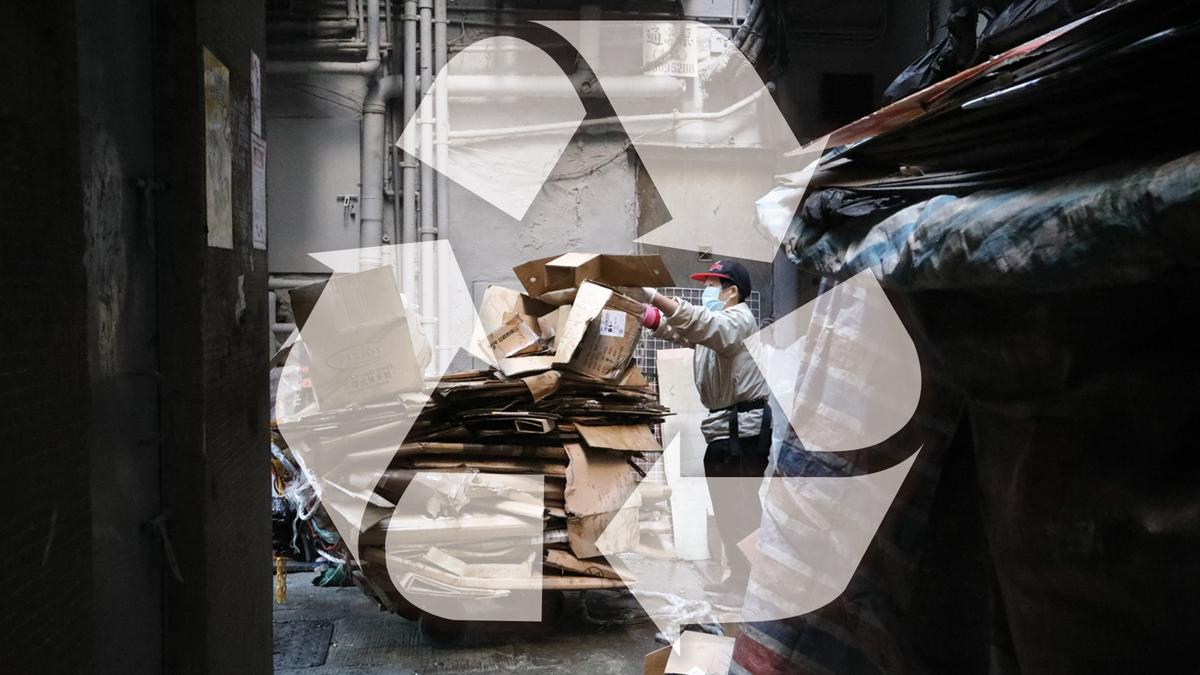
Hong Kong’s once-thriving paper recycling business may soon end up where it all started as garbage heaps — not on the streets but in landfills — if help isn’t forthcoming.
When the Chinese mainland started to tighten curbs on solid waste imports in 2017, Hong Kong’s recycling business was thrown into a quandary as Hong Kong exporters cut waste paper prices down by more than a half, and some even stopped collections.
While the volume of scrap paper — the second largest constituent of municipal solid waste — dumped into the city’s landfills had risen to 2,704 metric tons per day in 2019, its recycling rate hit a record low of 35 percent, down from 41 percent the year before.
The causes of the slide are import controls by overseas economies, as well as a continuous decline in international prices of waste paper, the Environmental Protection Department concluded in its report published in late December.
Over the past 15 years, almost all of Hong Kong’s paper recyclables were shipped out of the city. The mainland took in 91 percent of the city’s exported waste paper in 2017, according to a 2019 Legislative Council study.
The mainland’s total ban on imports of solid waste from Jan 1 this year is seen as the last in a series of steps that started in 2017 to end the “dumping, stacking and disposal of waste products from overseas on Chinese territory”. Southeast Asian countries, such as Indonesia and Malaysia, which could be alternative importers, have also been tightening import controls on waste paper, as waste started to head for their shores on the heels of the Chinese mainland ban.
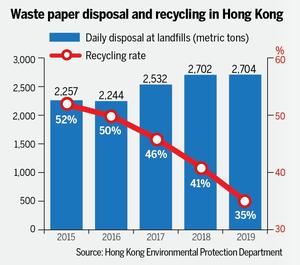
Waste paper crisis
The EPD told China Daily earlier this year that it was stepping into the crisis in a bid to give local recyclers a lifeline. The department said it was helping the government’s waste paper contractors explore new export markets like Vietnam, Thailand and Taiwan and collate trade regulations for setting up business networks.
An industry source, who preferred to remain anonymous, said Southeast Asian countries are not that attractive to Hong Kong exporters not only because it would cost 20 percent more to ship paper recyclables to those places than to the mainland. Other “concrete risks” they may have to face include that importers may not pick up the tab after shipment, he said.
Benjamin Steuer, assistant professor at the Hong Kong University of Science and Technology’s environment and sustainability division, agreed that import curbs in the past few years are mainly responsible for the shrinking recycling rate of scrap paper.
He said the local waste paper recycling rate may have fallen for 2020, but it would still beat pessimists’ estimates.
“Because of the social distancing measures, maybe less paper has been collected, and a lot of factories and collection yards had to stop operations,” he said.
“But during the pandemic more people have been relying on food delivery and other services delivered to their homes. This means you need more packaging (cardboard) and there would be demand for paper pulp (transformed by paper waste),” Steuer added.
The anonymous industry source, who works for a local paper exporter, said that during the pandemic, the quantity of paper waste he collected was almost halved, as companies consumed less paper due to work-from-home arrangements and print media outlets cut their daily circulation.
Who are the people involved in the entire recycling process? It starts with paper collectors carting their waste to small recyclers usually tucked away in alleys and lanes who would separate them before sending them to bigger recyclers for export.
The stakes may be reduced as exporters find nowhere to ship their paper piles. Industry pundits, nevertheless, are still holding out hope for the business, saying fears of a “paper jam crisis” this year may be far-fetched, and recyclers are still fighting to keep their heads above water although the doors for export remain slim.
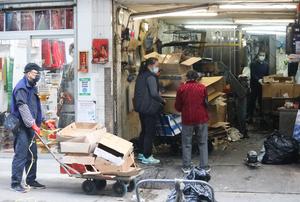 A man delivers cardboard boxes to a collection station in Yau Ma Tei on Jan 15, 2021. (Calvin Ng / China Daily)
A man delivers cardboard boxes to a collection station in Yau Ma Tei on Jan 15, 2021. (Calvin Ng / China Daily)
According to the source and media reports in early January, after the ban took effect on Jan 1, the mainland authorities agreed to a temporary arrangement to allow Hong Kong contractors to export paper waste to four designated mainland factories in the Guangdong-Hong Kong-Macao Greater Bay Area.
“I do hope the Hong Kong government will continue to negotiate with the mainland authorities and regularize their arrangements to prevent storage pressure piling up,” the source said.
Xinhua News Agency reported early last month that several papermakers on the mainland have been raising the prices of their products since December last year, mostly by about 200 yuan (US$31) per metric ton. The price upticks were partly attributable to the anticipated waste paper supply cut because of the mainland’s import bans, according to reports. The price of paper recyclables in Shanghai has risen by 300 yuan per metric ton since June last year.
“The good thing for Hong Kong recyclers is that waste paper prices on the mainland are surging. It’s a good sign more paper is needed. The bad thing is...we’re not sure how long this special arrangement will last. Recyclers in Hong Kong will be skeptical and adopt a wait-and-see attitude,” said Steuer.
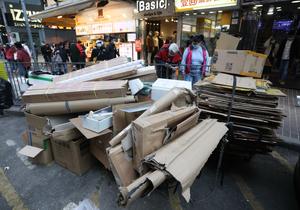 Cardboard boxes are collected and placed on a street in Mong Kok on Jan 15, 2021. (Calvin Ng / China Daily)
Cardboard boxes are collected and placed on a street in Mong Kok on Jan 15, 2021. (Calvin Ng / China Daily)
Recycling a way out
Secretary for the Environment Wong Kam-sing said recently that one way out is to build a pulping plant for local paper waste in the short term in addition to diversifying the outlets for recyclable exports. Pulping technology consumes less land, less energy and less water, and can handle those types of waste paper barred from being exported, such as discarded receipts, he said.
“We have been in contact with some of the potential tenderers. So far, their response has been encouraging. We are going to work on the tendering procedure in the first half of this year,” said Wong.
According to the EPD, the pulping plant will be located at EcoPark in Tuen Mun, New Territories, and is expected to start operation by 2024. It will probably be Hong Kong’s first paper recycling facility since September 2006, excluding a small-scale pulping factory in Yuen Long that targets beverage cartons and can only handle 10 metric tons per day.
The paper factory could have come earlier after Rocsky International secured two hectares of land at EcoPark in 2018 to build a recycling and manufacturing facility that could handle a third of the city’s waste paper starting from 2023. However, reports said Rocsky has withdrawn from the contract due to the higher-than-expected cost and a gloomy business climate. The swathes of land have been handed back to the government, which has to prepare another round of tendering.
For Hong Kong’s overall paper recycling policy, the government abandoned its laissez-faire mindset, enlisting 17 contractors through open tendering last year. The deals with contractors, totaling HK$440 million (US$56.75 million), are in line with the government’s commitment in its 2020-21 budget to set aside at least HK$300 million annually to subsidize contractors in collecting, screening, sorting and baling waste paper before selling to other markets.
Since September last year, contractors have been collecting waste cardboard, newspapers and office papers from street corner recycling shops, mobile recyclers and front-line collectors across the city at prices no less than 70 Hong Kong cents per kilogram as required, to stabilize the income of front-line collectors, mostly elderly people known as “cardboard grannies”. The price had once dived to as low as 20 Hong Kong cents per kg.
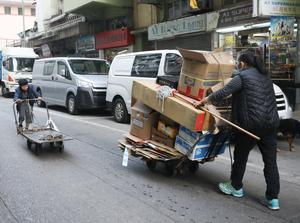 Two paper collectors are seen on a street
in Yau Ma Tei on Jan 15, 2021. (Calvin Ng / China Daily)
Two paper collectors are seen on a street
in Yau Ma Tei on Jan 15, 2021. (Calvin Ng / China Daily)
It’s our responsibility to recycle waste paper locally instead of exporting it, which would otherwise put burdens on other countries and regions.
Stanley Wong Yu-sum, senior public affairs officer of local NGO Greeners Action
Stanley Wong Yu-sum, senior public affairs officer of local NGO Greeners Action, agreed that a local pulping factory could be a way out. “It’s our responsibility to recycle waste paper locally instead of exporting it, which would otherwise put burdens on other countries and regions,” he said.
However, he said the fundamental approach to Hong Kong’s waste problem is to urge people to generate less waste by, for example, imposing waste disposal charge on residents, a proposal that was put forward 15 years ago but dumped again last year.
Steuer questioned the feasibility of subjecting local households to trash disposal fees, which he thinks would harm underprivileged families. The government could instead promote a reimbursement mechanism, namely, to return cash incentives to people who classify and bring recyclables to collection sites, he suggested.
On Jan 17, a China Daily reporter took 1.6 kg of recyclables, mostly scrap paper, to a government-funded recycling store in Sai Ying Pun, western Hong Kong Island, and spent less than two minutes sorting them out following staff instructions.
The store, which opened on Nov 16 last year, is operated by local NGO 121C Society for Recycling, which is designated to run two other such facilities in Tin Hau and Tin Wan. It is among 22 such stores, as well as other 11 larger collection stations, across the city, funded by the Green@Community project.
The Sai Ying Pun store collected 1,984 kg of scrap paper in December — more than quadruple the 452 kg in the second half of November — according to the store’s records.
William Lam, the NGO’s worker at the site, said the store gets an average of about 180 visitors per day on weekdays, and more than 250 on weekends.
People will be given “green points” on a smart card they have applied for after dropping their recyclables at the stores, such as newspapers or glass bottles. The accumulated points can be used to redeem gifts such as food and daily necessities.
“We’ve been seeing an increasing number of residents who take recyclable waste to us. What’s important to do now is to inform more people of our presence and encourage them to join this green life initiative through online promotional campaigns,” said Lam.
Steuer said NGOs are playing their role “very well” in Hong Kong’s paper recycling, particularly in raising people’s awareness, although their operations have been disrupted by the COVID-19 pandemic and the social unrest in 2019.
“From my experience in China, people are more likely to accept something when it comes from NGOs in regard to recycling than when it comes from the authorities. This is a natural pattern of behavior,” he said.
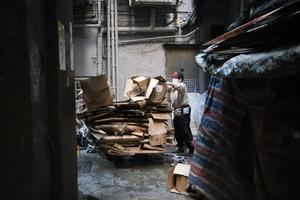 A worker deals with waste cardboard collected in Mong Kok on Jan 15, 2021. (Calvin Ng / China Daily)
A worker deals with waste cardboard collected in Mong Kok on Jan 15, 2021. (Calvin Ng / China Daily)
Despite all the hype about reviving the waning industry, the research office of the Legislative Council Secretariat concluded in a policy document in April 2019 that global recycling is still not a commercially viable business due to growing cut-throat competition in the market, as well as dwindling demand for recycled products.
In the words of a local recycler: “Instead of going forward, we may now return to where we all started from — rubbish heaps on the landfills.”
Kathy Zhang contributed to this story.
Contact the writer at jefferygu@chinadailyhk.com


